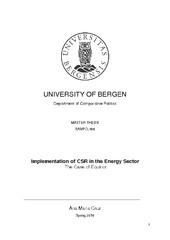| dc.description.abstract | Globalization has made possible global social relations, and understandably these social relations also need governance. Corporate social responsibility is a concept within the business sector relevant for corporate governance in our modern economy, as it is understood as a clever approach to address the regulatory vacuum created by the global economy.The purpose of this dissertation is to understand better how is the interaction between the government and the companies when attempting to address the regulatory vacuum. Accordingly, the research question to be investigating under this thesis is “How does Equinor implement corporate social responsibility policies and how does the Norwegian state influence this?”. For this project three parliamentary reports are particularly relevant: Stortingsmelding nr. 13 (2010–2011, Stortingsmelding nr. 27 (2013–2014 and Regjeringens Eierpolitikk 2015. Additionally, two main documents from Equinor are essential; the code of conduct and the Equinor book. In this project it has been concluded that corporate social responsibility is implemented in Equinor, through decentralized regulations. Equinor takes focus on an implementation with a top-down dynamic, but actively tries to combine it with the bottom-up approach by open dialogue. Equinor also follows a cultural perspective within an instrumental justification. When it comes to the Norwegian government, the state appears to be a strong player that follows a normative justification with an international approach. For the Norwegian government CSR is a moral obligation for global governance and important when addressing the regulatory vacuum in the international arena. The project also shows that the Norwegian state implements CSR by using a variety of measures, laws, regulations and expectations to business on CSR. Equinor, on the other hand, have established a set of in-depth codes and policies towards CSR. the governmental expectations appear to be an important tool when supplying support or even forming the companies, as it performs as external pressure. | en_US |
